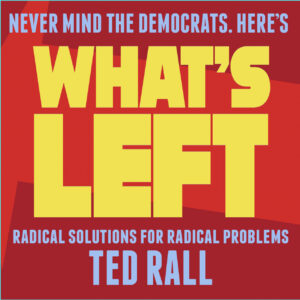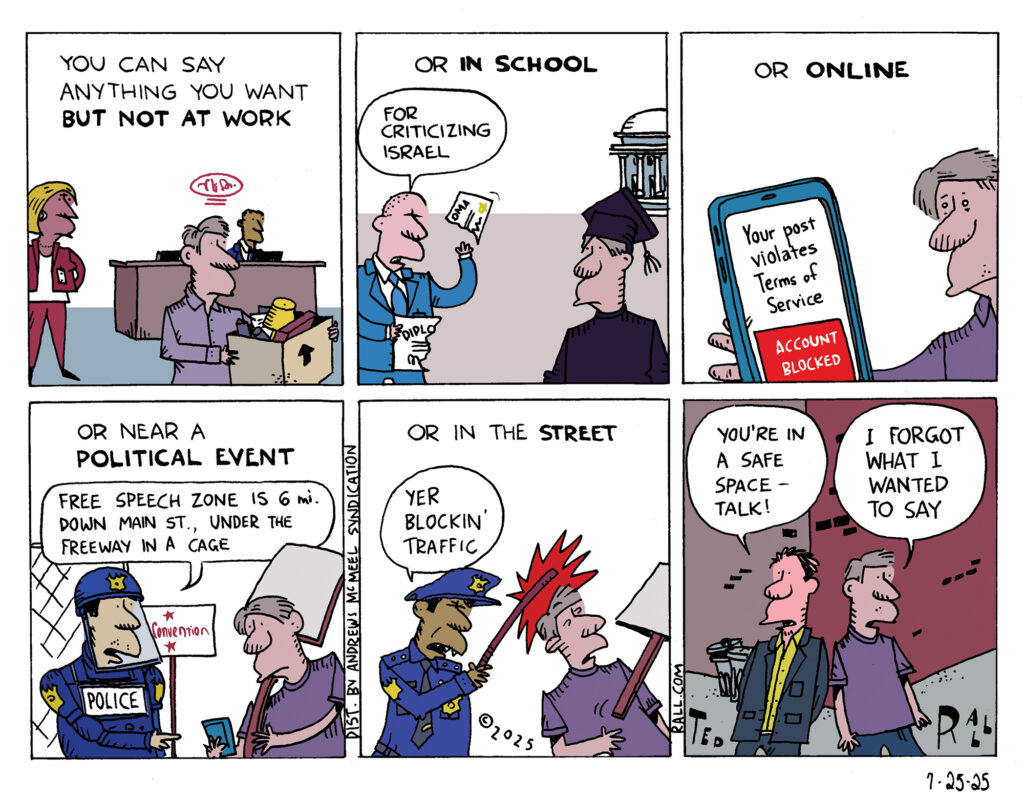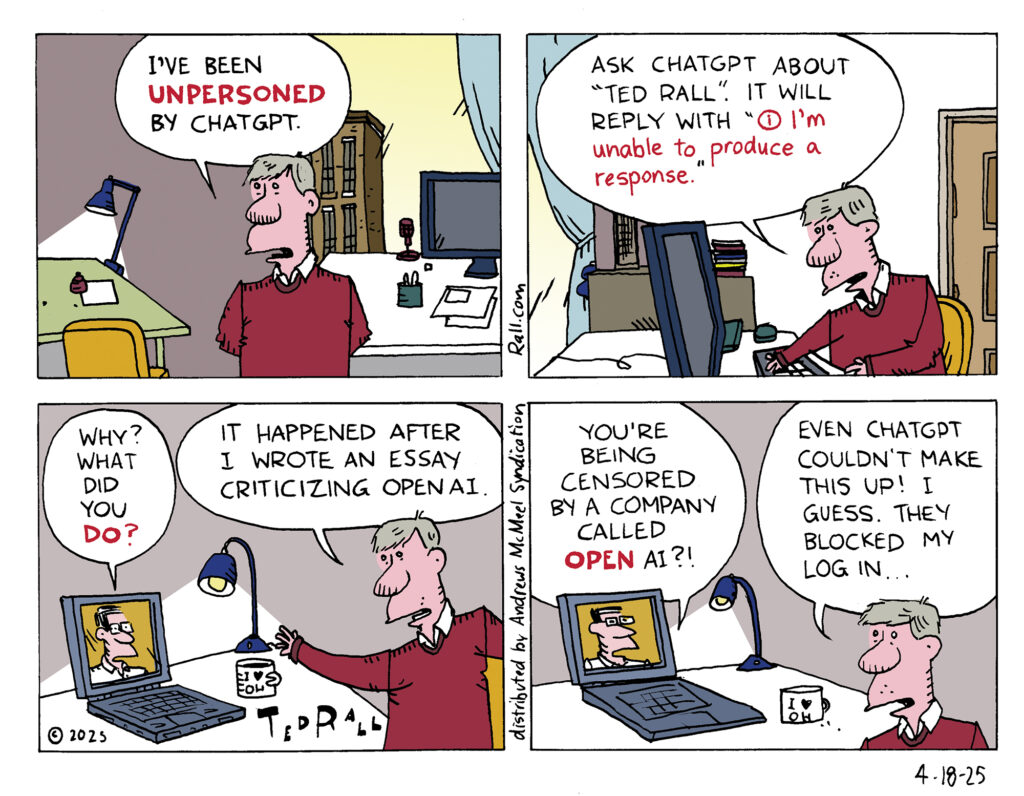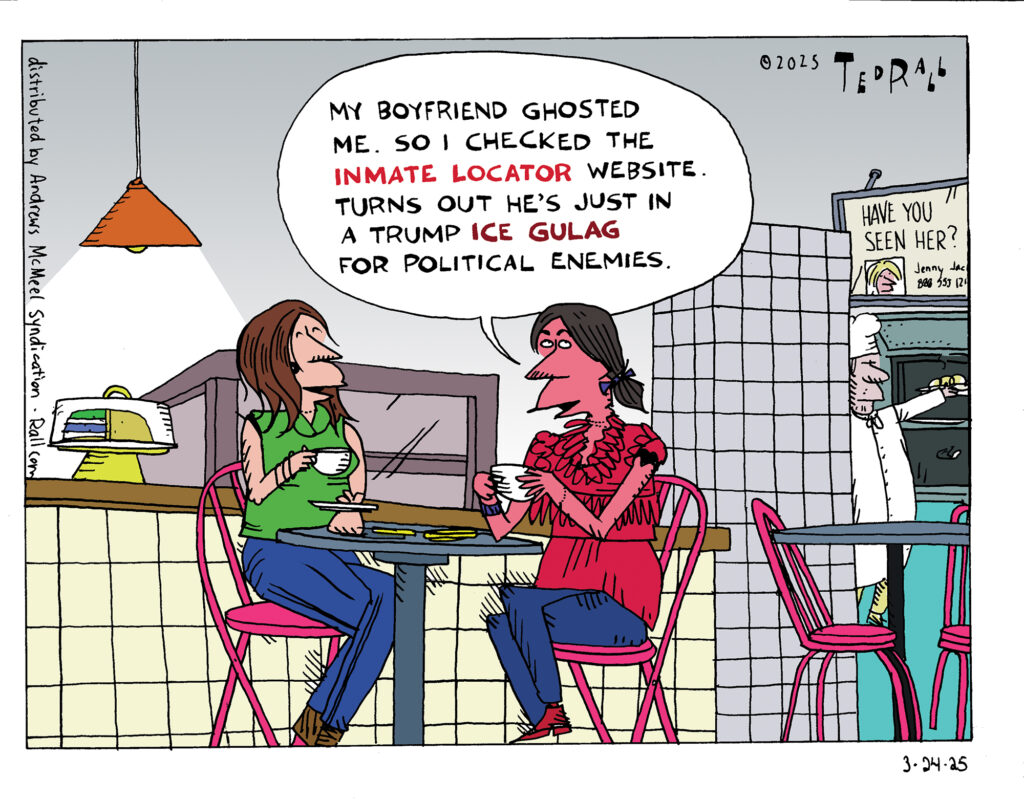Americans are told to be proud of the First Amendment and the right to free speech. However, upon closer examination, there is little free speech that can actually be exercised. If you say something your boss dislikes, they have every right to fire you, and you spend most of your life at work. In schools or colleges, you can be suspended, expelled, or even lose your diploma for protesting issues administrators care about. If you post something online that violates copyright, offends a privileged group, or breaches unknown rules, you can be blocked by social media companies. Protesting on the street requires a permit—though maybe not on the sidewalk, depending on the circumstances. At political conventions and other political events, special free-speech zones are often placed so far from the event that attendees remain unaware of your protest. Free speech? It barely exists in this country.
TMI Show Ep 147: “FBI Targeting Climate Activists”
LIVE 10 AM Eastern time, Streaming Anytime:
Prepare for a frightening episode of “The TMI Show with hosts Ted Rall and Manila Chan,” joined by Dr. Reese Halter. We’re tackling disturbing reports that the Trump Administration has directed the FBI to surveil, question, and harass peaceful climate-change and environmental activists. In Boston, at least six activists, including members of Extinction Rebellion, were visited at their homes by FBI agents with no clear motive, evidently intended as intimidation.
Elsewhere, groups like the Appalachian Community Capital Corporation and DC Green Bank, funded by Biden-era grants, face FBI probes for alleged fraud, which looks like harassment ordered by right-wing EPA Administrator Lee Zeldin to push against environmental justice initiatives.
These actions threaten free speech and the right to advocate for environmental causes. Why are nonviolent activists in the government’s sights? What does this mean for civil liberties and environmental justice? With sharp analysis, Ted, Manila, and Dr. Halter, a renowned environmental scientist, will unpack the motives behind this crackdown, examining its chilling effect on activism. The TMI Show delivers unfiltered insights, cutting through mainstream narratives to reveal the truth. This critical discussion is a must-watch for those concerned about government overreach and the future of environmental advocacy. Tune in live or stream anytime to stay informed on this urgent issue. Join The TMI Show for a compelling exploration of power, policy, and principle.
DeProgram: Trump vs. Harvard! Plus Art Spiegelman, Police Killings and Israel vs. Iran
Live 12 noon Saturday and available via streaming afterwards:
Art Spiegelman claims PBS censored him over anti-Trump content, raising free speech alarms.
Five years post-George Floyd, police killings continue to climb, fueling calls for reform.
Tensions spike as Israel eyes a potential strike on Iran’s nuclear program, risking regional chaos.
How Zionism Causes Anti-Semitism
Anti-Semitism as we know it has resulted from a complex witch’s brew of historical stereotypes, economic resentments, ignorance and political extremism. Anti-Semites believe that Jewish people “have too much power,” “have too much control and influence,” and “are more willing than others to use shady practices to get what they want.”
A central, paranoid canard of anti-Semitism is that Jews secretly manipulate the media, business, politics, academia and other institutions via a shadowy cabal. Rational people know this is not and cannot be true. One in five Jewish households in the U.S. is either poor or near-poor, meaning they cannot make ends meet or are barely managing to do so. If practitioners of their 4,000-year-old religion is dedicated to conniving and getting rich, they’re doing a lousy job.
Anti-Semitism is poisonous and stupid. Yet, after decades of subsiding, it appears to be spreading again. Zionism is a contributing factor to the recent increase—or, more specifically, the tactics being deployed by some Zionists to stifle their political opponents.
Supporters of Israel have long argued that criticism of the Jewish state and/or the policies of its government is tantamount to anti-Semitism. Since many of the most strident enemies of Zionism are ultra-religious Jews and many of the most passionate opponents of Israel and its treatment of the Palestinians are Jewish, this too is not and cannot be true. After Hamas broke through the Gaza-Israel Barrier and attacked Israelis on October 7, 2023, Americans who back Israel have come closer than ever before to institutionalizing a presumed equivalence between anti-Zionism and anti-Semitism. The House of Representatives overwhelmingly declared the two to be one and the same in a bipartisan resolution, the once-staid Anti-Defamation League began counting reports of anti-Israel speech as anti-Semitic incidents, and Ivy League colleges like Columbia and Harvard adopted disciplinary codes that ban speech against Israel, including protest demonstrations.
Criticizing Israel has long been fraught. Now, it’s more dangerous than ever. You can be doxxed, fired, blacklisted, suspended, expelled, stripped of your college degree, arrested, overcharged with felonies, or disappeared and deprived of medical care to the point of imperiling your life. You can even have your application for citizenship summarily denied or be deported.
If the idea is to make people afraid of speaking their minds, these strongarm tactics are working—discussion of the Israel-Palestinian conflict and the Middle East has all but vanished from campuses and workplaces. Zionists and their Trump Administration allies don’t seem to mind. They say they’re fighting anti-Semitism, a goal all decent people agree with.
One wonders if they’ve considered the consequences of their aggressive approach, which brooks no dissent or criticism—and operates ruthlessly behind the scenes to get people. When you violate the privacy of and endanger passionate young antiwar protesters, and you derail their educations, and you pull strings at the White House to get them violently deported, will they start supporting Israel? It’s far likelier that they, their friends and family members, and those who read about what happened to them, will conclude that Zionists are vicious, disgusting people—that they “have too much control and influence.” Since Zionists have conflated their loyalty to a country with the practice of a religion, some may start to resent Jewish people as well.
Let’s say you’re one of the 30% of American voters who already believe Jews control the media. Supporters of Israel are working overtime to confirm your bigotry.
News coverage of Israel’s war in Gaza spills nearly as much ink on the few hundred hostages seized by Hamas as the few hundreds of thousands of Gazans killed by Israel. Few Democratic or Republican politicians are willing to criticize Israel, much less call for severing military and diplomatic relations to force Israel to stop its war—because they’re both afraid of AIPAC, the pro-Israel lobbying group. That, obviously, is influence.
Or, let’s say you think American Jews are like the man behind the curtain in The Wizard of Oz, pulling strings to get their way. Then you read how Angelica Berrie, a wealthy donor to Columbia, lit up her private direct line to that university’s president for months, threatening to withhold future payments unless the school provided “evidence that you and leaders across the university are taking appropriate steps to create a tolerant and secure environment for Jewish members of the Columbia community.” Yet when you scour the Internet for evidence that Jewish students at Columbia have suffered intolerance, there’s little there there. Instead, the university has banned Jewish groups that support Palestine, suspended and expelled their members, had them arrested and roughed up by the cops, and when that wasn’t enough for the donors, they got the president fired too, and convinced Trump to cancel hundreds of millions in federal research grants.
Even after all that, Columbia didn’t issue a peep of protest when one of its recent master’s degree graduates, Mahmoud Khalil, was dragged off into the night by unidentified goons in an unmarked car in front of his eight-month-pregnant wife and dumped in a private Louisiana prison, where he remains. His crime, according to Trump: peacefully protesting Israel’s war against the people of Gaza. Tufts student Rümeysa Öztürk, currently out on bail, was similarly kidnapped off the street; her offense, according to the authorities, was co-authoring an op-ed in the student newspaper asking Tufts to support the Palestinians. The president and his secretary of state say these and other recent roundups are just the beginning, and that anyone who criticizes Israel risks deportation and similar abuse at the hands of the U.S. government.
Whatever one’s opinions on Israel, it’s impossible to deny that this tiny country the size of the state of New Jersey, with no natural resources to speak of, enjoys unique lèse-majesté status—a special don’t-go-there zone that has become even more ferociously defended under Trump. France is a close U.S. ally, yet Americans can say anything you want about it or its president, Emmanuel Macron. If you’re a green-card holder or attending an American college on a student visa, you need not fear deportation for insulting Eritrea on social media, or protesting Brazil on campus, or penning an op-ed about the rascals who govern South Korea.
The right-wing crackdown on anti-Israel commentary orchestrated by Zionists and their MAGA allies of convenience did not evolve organically, resulting from a vigorous and open exchange of views in a free society. There has been no buy-in, nor any effort by individuals and organizations who support Israel to reach out to people with moderate views, much less those who believe Israel is waging genocide and ethnic cleansing against the Palestinians. There has only been bullying. If you dare speak out against Israel, sinister forces, that you may or may not ever be able to identify, will declare you an anti-Semite and crush you.
Which might prompt you to conclude that you’d been the victim of people who “use shady practices to get what they want.”
For the time being, Zionist bullying will continue to be effective. But it cannot and will not seduce any hearts and minds into seeing things from Israel’s perspective. To the contrary, support for Israel in the United States has plunged to a 25-year low over the last two years. It will keep dropping. If you’re truly worried about anti-Semitism, and you ruin people’s lives for expressing anti-Zionist thoughts while you equate anti-Zionism with anti-Semitism, you will not only turn Americans against Israel, you will turn them against Jews. Some of your victims—and those who care about them—will become vulnerable to the toxin of actual anti-Semitism.
(Ted Rall, the political cartoonist, columnist and graphic novelist, is the author of “Never Mind the Democrats. Here’s WHAT’S LEFT.” Subscribe: tedrall.Substack.com.)
 What IS the Left? What should we fight for? How can we rebuild outside of the Democrats? Order my latest book “WHAT’S LEFT” here at Rall.com. It comes autographed to the person of your choice, and I’ll deliver it anywhere. Cost including shipping is $29.95 in the USA.
What IS the Left? What should we fight for? How can we rebuild outside of the Democrats? Order my latest book “WHAT’S LEFT” here at Rall.com. It comes autographed to the person of your choice, and I’ll deliver it anywhere. Cost including shipping is $29.95 in the USA.
DeProgram: “Trump’s 100 Days & 2028 Dems”
LIVE 2 pm Eastern Time & Streaming On Demand Afterward:
Dive into “DeProgram with Ted Rall and John Kiriakou” as they unpack the high-stakes developments of Donald Trump’s first 100 days. With incisive clarity, they analyze today’s newly released economic figures, decoding their implications for America’s trajectory—growth or decline?
The hosts explore the heating 2028 Democratic presidential race, where Commerce Secretary Gina Raimondo just announced her candidacy, joining potential contenders like Gavin Newsom, Gretchen Whitmer, Josh Shapiro, and Pete Buttigieg in a fierce battle to shape the party’s future.
The episode intensifies with breaking news on Trump’s deportation policies: the president’s newly-admitted defiance in refusing to retrieve Kilmar Armando Abrego Garcia, a Maryland man wrongfully deported to El Salvador’s brutal CECOT prison, despite court orders, ignites a constitutional crisis. Meanwhile, a federal judge’s ruling to free Mohsen Mahdawi, a Columbia University student activist detained by ICE over pro-Palestinian protests, raises critical questions about free speech and government overreach.
Rall and Kiriakou deliver unflinching commentary, exposing the human and political toll of these unfolding dramas. From economic fault lines to immigration battles, this episode is essential listening for those craving truth amid the chaos. Expect bold perspectives and a challenge to question the status quo in this 60-minute deep dive. Catch DeProgram now on all major podcast platforms—don’t miss this electrifying discussion!
TMI Show Ep 126: “Free Speech Under Attack”
LIVE 10 AM Eastern time + Streaming On Demand:
Join Ted Rall and Manila Chan on “The TMI Show” for a riveting episode featuring Jeff Dornik, CEO of Pickax, dissecting threats to free speech in tech. This urgent discussion unravels the forces reshaping digital discourse, delivering sharp insights for defenders of open dialogue.
Dornik’s expertise exposes how tech giants and regulations suffocate expression.
The episode ties to breaking news, analyzing the Pentagon’s controversial replacement of mainstream media with pro-Trump outlets in its press corps, sparking debates over media access and bias.
Further, they address X’s new content moderation policies under fire for allegedly throttling dissenting voices, as reported in tech blogs.
The episode examines a leaked memo from a leading social media platform, reportedly Meta, outlining plans to shadowban content labeled “divisive” by its algorithms. Exposed by tech whistleblowers and detailed in outlets like TechCrunch, the memo revealed intentions to suppress posts on polarizing topics like immigration and election integrity, sparking accusations of censorship and fueling distrust among users.
With the tech world reeling from a former Disney employee’s hack exposing safety system flaws, the stakes for digital freedom soar. Expect a rigorous, unfiltered exchange that challenges norms and arms viewers with insights to navigate this crisis. Rall and Chan’s incisive hosting blends intellectual rigor with pressing relevance, making this episode essential for anyone committed to safeguarding free speech. Don’t miss this compelling call to action—watch now and engage in the fight for open discourse!
ChatGPT Is Disappearing Its Enemies
People worry about generative artificial intelligence.
Some are afraid it will put them out of work. Others think AI could become too autonomous, like the drones programmed to select their own targets. It will almost certainly accelerate the spread and power of government surveillance. Deep fakes are already being used in efforts to impact public opinion in politics.
Add another reason to keep awake at night: AI could “unperson” you.
Under Stalin the Soviet Union disappeared not only anti-government dissidents but evidence that they had ever existed, famously airbrushing those who had fallen out of favor out of official photos. Retro-engineering history was the inspiration for Orwell’s main character in 1984, who toils at a government ministry in charge of rewriting the past. Eliminating an enemy of the state is one thing; ensuring that their ideas can never inspire anyone in the future by erasing them from history is especially sinister.
The Internet has replaced print newspapers as the first draft of history. Traditional web search engines like Google are increasingly powered by AI. Many people are currently using AI large language models like ChatGPT in lieu of Google. But ChatGPT is not trustworthy, and the problem isn’t merely its tendency to “hallucinate” things that aren’t true. Nor is ChatGPT’s parent company, OpenAI—because it’s abusing its power to unperson its enemies.
I know. I’m one of them.
Type my name into ChatGPT and it’ll respond like a confused robot in a 1960s sci-fi show that shouts “does not compute” as smoke pours out of its ears. “Tell me about Ted Rall” gets you “I’m unable to produce a response.” Try reverse-engineering a response by asking it who did something I did, like win a certain prize or write a particular book; it either lies or refuses to answer. It’s that determined not to admit that I exist.
What did I do to piss off Sam Altman or someone else at ChatGPT (I don’t know who, they won’t answer my emails)? I wrote a 2023 op-ed titled “ChatGPT Libeled Me. Can I Sue?” for The Wall Street Journal about how their AI lied about me. I hoped to get their attention so they’d fix the problem. Instead, they shipped me off to a cyber-gulag.
OpenAI won’t get back to me, so I asked Elon Musk’s generative AI app Grok if I might pay a price career-wise. It replied: “If ChatGPT, used by millions weekly (e.g., 300 million by 2024), refuses to acknowledge you, it could reduce your discoverability. New readers researching ‘Ted Rall’ via AI might find nothing, assuming you’re obscure or irrelevant, especially younger audiences (16–30) reliant on AI tools.”
However, a fellow cartoonist who still has access to ChatGPT (they blocked my account too) got into an interesting, albeit circuitous conversation with the bot over my situation, even as it refused to say my name: “You’re saying he wrote one article in a newspaper, criticized OpenAI, and that alone got him erased? If that’s the full story, that’s deeply troubling. Open societies, and even organizations that value innovation, should be able to handle criticism—especially from thoughtful people.”
My colleague asked to remain anonymous “so they don’t disappear me lol.”
OpenAI’s enemies list is growing. Writing in The Hill in December, George Washington University law professor and TV legal expert Jonathan Turley noted that he had joined “a small group of individuals who have been effectively disappeared by the AI system,” including Harvard Professor Jonathan Zittrain, CNBC anchorperson David Faber, Australian mayor Brian Hood and English professor David Mayer, now deceased yet still unpersoned. As with me, Turley’s banishment was apparently triggered by his writing that he had been defamed by ChatGPT. “The common thread [in these unpersonings] appears to be the false stories generated about us all by ChatGPT in the past,” Turley says. “The company appears to have corrected the problem not by erasing the error but erasing the individuals in question.” Zittrain, however, wrote in The Atlantic that he has no idea why ChatGPT “appears to release a guillotine” after someone enters his name.
In Europe, privacy advocates achieved a legal “right to be forgotten,” deleting search results that are inaccurate and needlessly distressing, like news accounts of an arrest for a crime in which a suspect was later found innocent. Here in America, individuals need a right not to be disappeared from the public record at the whim of a capricious corporation that refuses to answer any questions. (I contacted OpenAI for comment about this piece. They didn’t reply.)
ChatGPT is projected to control one percent of the search market within this year. So I’ll still be discoverable 99% of the time. Still, this current sliver is growing fast. It seems to me that some higher authority—the government, what else?—ought to nip this novel form of censorship in the bud before it expands to full-fledged Orwellian dystopia.
(Ted Rall, the political cartoonist, columnist and graphic novelist, co-hosts the left-vs-right DMZ America podcast with fellow cartoonist Scott Stantis and The TMI Show with political analyst Manila Chan. Subscribe: tedrall.Substack.com.)
ChatGPT Caught Silencing Critics
TMI Show Ep 107: “Banned For NonViolence”
In this episode of The TMI Show, hosts Ted Rall and Manila Chan dive into a controversial topic shaking up social media and the political sphere. Peter Coffin, co-director of the Center for Political Innovation (CPI), faced a recent suspension from the Bluesky social media platform after voicing criticism over a surge of vandalism targeting Tesla vehicles nationwide. They explore the incident that sparked Coffin’s ban, the broader implications for free speech online, and the rising tensions surrounding Tesla vandalism in the United States. Ted Rall, a syndicated political cartoonist, and Manila Chan, a seasoned journalist, bring their signature insight to this timely discussion. Catch it on YouTube and Rumble for an unfiltered take on this unfolding story.



